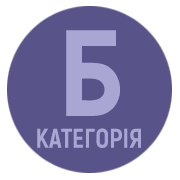REFLECTION OF VOCABULARY OF TURKIC ORIGIN IN THE «DICTIONARY OF THE LANGUAGE OF UKRAINIAN FOLKLORE»
DOI:
https://doi.org/10.32782/philspu/2024.6.6Keywords:
borrowings, historical songs, language of folklore, Dictionary of the Language of Ukrainian Folklore, TurkismAbstract
The article provides a lexicographic description of words of Turkic origin used in the texts of historical songs of the Ukrainian people. The material for this description was extracted from the collection «Historical Songs» (1970), compiled by I. P. Berezovsky. The article states that Turkism has entered the Ukrainian language mainly orally. Of course, they also penetrated the historical songs of the Ukrainian people, since the oral nature of creation and existence is a determining factor for the functioning of any folklore text. It has been established that a significant part of the words of Turkic origin used in the relevant collection are deeply rooted in the Ukrainian language, have become a significant asset of the cultural and historical heritage of Ukrainians, and have been filled with national and cultural content reflecting certain milestones of the Ukrainian people's formation and development. The article also substantiates the necessity of creating a special dictionary to reflect the vocabulary used in the language of Ukrainian oral folk art. The research also proves the necessity of reflecting the words of Turkic origin in the said lexicographic development. Because of studying the relevant linguistic material in the above-mentioned collection, we have identified different groups of vocabulary borrowed from Turkic languages. In particular, the following: names of persons on various grounds (belonging to an ethnic, linguistic or religious community, belonging to a certain social status, occupation, participation in national liberation movements, physical disabilities), names of military and administrative units, names of spatial concepts (natural and anthropogenic), names of household concepts, appliances and tools, names of musical instruments. So far, we have used only material from the aforementioned collection of historical songs of the Ukrainian people for our analysis, which gives a preliminary idea of the influence of Turkic lexical elements on the language of folklore. However, in the future, in order to generalise and obtain a more holistic view of the extent of the influence of Turkic languages on the lexical composition of the Ukrainian folklore language, it will be necessary to use evidence from other genres of oral folklore. A separate dictionary could also be developed to reflect Turkism used in folklore.
References
Кримський А.Е. Тюрки, їх мови та літератури. Вип. ІІ. Київ : УАН, 1930. 106 с.
Лучик В.В. Тюркізми в топонімії України: історико-етимологічний аспект. Linguistica. 2015. № 55. С. 251–262. https://doi.org/ 10.4312/linguistica.55.1.251-262.
Халимоненко Г. Тюркізми арабського походження в українській мові. Вісник Київського національного університету імені Тараса Шевченка. Східні мови та література. 2014. Вип. 1. С. 34–38.
Халимоненко Г.І. Тюркізми у професійно-виробничій лексиці української мови (лексика тваринництва): дис. … докт. філол. наук : 10.02.13 ; 10.02.01. Київ, 1996. 417 с.
Халимоненко Г. Праці : у 5 томах. Т. 1. Тюркська лексична скиба українського словника. Київ, 2020. 592 с.
Дочу А.Р. Українські орнітоніми тюркського походження. Наукові записки Національного університету «Острозька академія». Серія «Філологічна». 2015. Вип. 51. С. 195–197.
Дочу А.Р. Тюркізми-неологізми в українській мові. Науковий вісник Міжнародного гуманітарного університету. Серія «Філологія». 2018. № 37. Т. 4. С. 40–42.
Дутка О.Я. Тюркізми як джерело поповнення омонімів сучасної української мови. Науковий огляд. 2020. Т. 3. № 66. С. 162–174.
Мяло А.С. Тюркізми в українській історичній прозі (на прикладі роману «Мальви» Романа Іваничука). Магістеріум. 2014. Вип. 57. С. 76–79.
Халимоненко Г.І. Тюркська військова лексика у мовленні українського козацтва : автореф. дис. … канд. філол. наук : 10.02.01. Київ, 1993. 23 с.
Рибалка Я. Тюркські лексичні запозичення у військовій терміносистемі XVII–XVIII ст. Вісник Національного університету «Львівська політехніка». Серія «Проблеми української термінології». 2006. № 559. С. 241–245.
Енциклопедичний словник символів культури України / за заг. ред. В.П. Коцура, О.І. Потапенка, В.В. Куйбіди. Корсунь-Шевченківський : ФОП Гавришенко В.М., 2015. 912 с.
Словник символів культури України / за заг. ред. В.П. Коцура, О.І. Потапенка, М.К. Дмитренка. Київ : Міленіум, 2002. 260 с.
Сердега Р.Л. Фольклорна лексикографія як новий вектор розвитку українського словникарства. Наукові записки. Серія «Філологічні науки». 2023. № 206. С. 128–135. https://doi.org/10.32782/2522-4077-2023-206-19.
Історичні пісні / упоряд. І.П. Березовський. Київ : Рад. письменник, 1970. 286 с.
Сердега Р. Стилістичні параметри лексикографічного опису мови фольклору. Волинь філологічна: текст і контекст. 2020. Вип. 29. С. 129–140.
Сердега Р. Методологійні засади розробки структури словникової статті для «Словника мови усної народної словесності» (сталі та текстово-образні одиниці. Alfred Nobel University Journal of Philology. 2023. № 2(26/1). С. 232–247. DOI: 10.32342/2523-4463-2023-2-26/1-17.
Етимологічний словник української мови : у 7 т. / гол. ред. О.С. Мельничук. Київ : Наукова думка, 1982. Т. 1. 632 с.; 1985. Т. 2. 572 с.; 1989. Т. 3. 553 с.; 2003. Т. 4. 657 с.; 2006. Т. 5. 705 с.







